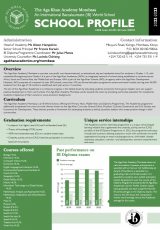Little Scholars Impress With Projects at PYP Exhibition
Student explains his research process to his classmatesThe Junior School held its annual Primary Years Programme (PYP) Exhibition from 05-06 May, 2016. The event started off with an opening ceremony that welcomed the guests, including the Executive Secretary of the Department of Education and Environment, Honorary Lewa Tendai, and Junior School parents.
The Exhibition is a culminating PYP experience and reflects all the major features of the programme. Students are expected to exhibit the attributes of the International Baccalaureate (IB) learner profile, which includes Inquirers, Open-Minded, Knowledgeable, Caring, Thinkers, Risk-Takers, Communicators, Balanced, Principled, and Reflective. "This is what I often refer to as the 3rd Dimension in the International Baccalaureate Primary Years Programme, where students take their skills and knowledge and apply them in an authentic and meaningful contexts which develops the whole child including the attributes of the Academy Learner Profile. Using and applying information for the cause of making a positive difference to others can be referred to as Service or Experiential Learning and it is believed that in interacting with real-life contexts students are brought to a deeper level of understanding of the issue at heart," said Junior School Principal, Isla Gordon.
Student presentation on cerebral palsyAdditionally, the Exhibition provides students with the opportunity to engage in action by reflecting on their learning and applying it to real-world issues through an appropriate course of action that they identify based on their research. The most important aspect of the students’ research process is the in-depth inquiry that guides and shapes their projects.
The theme of this year’s Exhibition was “We can take action on issues we care about in ways that result in change.” Student projects tackled first-aid snake-bite treatments, raising awareness about disabilities such as cerebral palsy, effective waste management, air pollution caused by public transport, and other issues of global significance.
Hon. Lewa Tendai appreciates student projectsA large number of students focused on environmental issues, and the Chief Guest, Hon. Lewa Tendai, was very impressed that the students took initiative to contact government officials about some of these issues. He appreciated that through their projects, the Academy’s little scholars had identified sustainable development solutions that the government is also planning to implement.
The students went through a rigorous research process while developing their projects for the Exhibition. The first stage involved identifying an issue they felt passionate about and formulating research questions in relation to it. Their initial sources of information were various sites they visited, experts whom they interviewed, and also other members of the community affected by the issue. This diverse range of sources allowed the students to access multiple perspectives about the issues they were investigating.
Teachers acted as mentors and guided the students throughout their research process. After gaining a thorough understanding of the identified issue, students took action in an attempt to devise solutions. Khona Bhattacharjee, PYP Coordinator said, “One child investigated the issue of air pollution in Mombasa, and decided to come to school by walking or by riding a bike; this was a feasible action for him due to the close proximity of his residence from the school. In order for their ideas to be sustainable and age appropriate, the students presented to a panel and faced critique and praise, and were often told to review their action plans.”
Students share research findings at the PYP Exhibition with AKA Maputo via SkypeWhile preparing their action plans for the PYP Exhibition, the students benefited immensely from feedback by panelists both at the Academy in Mombasa and also by panelists from Aga Khan Academy Hyderabad, who provided their feedback via Skype sessions. Collaborative learning is an important part of education at the Aga Khan Academies and helps students develop a global conscience, which is a key aspect of the academies’ vision and mission. Khona adds, “Our biggest aspiration as teachers is always to give the students the experiences that would bring their learning to real action, that would nurture the dispositions to work collaboratively. The Exhibition is one such process that the students go through in their final year in Junior School here at the Aga Khan Academy Mombasa and other IB PYP schools.”
By Haifa Badi-Uz-Zaman





